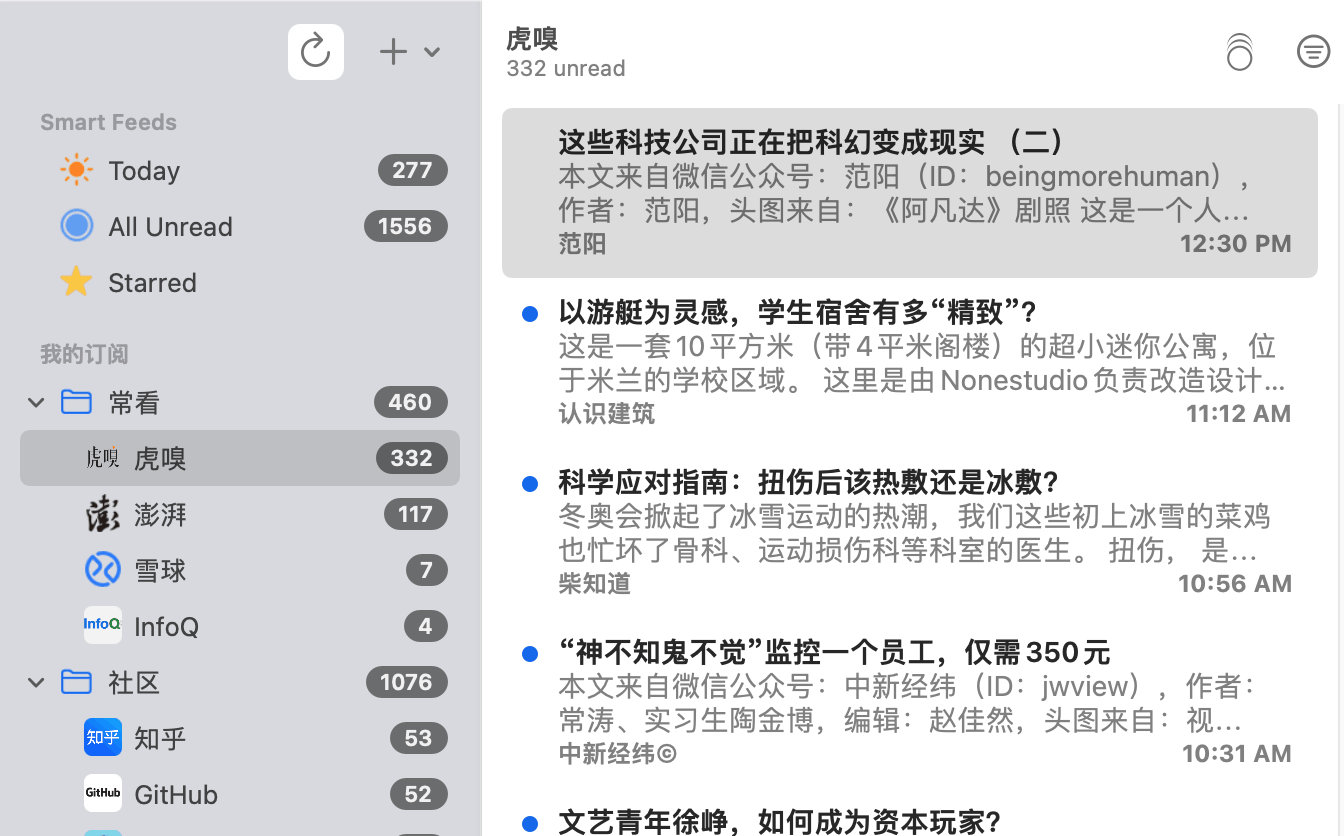
RSS (English full name: RDF Site Summary or Really Simple Syndication), Chinese translation: Simple Information Aggregation, also known as aggregated content, is a message source format specification used to aggregate content updates from multiple websites and automatically notify website subscribers. After using RSS, website subscribers no longer need to manually check whether websites have new content. At the same time, RSS can integrate content updates from multiple websites and present them in summary form, helping subscribers quickly obtain important information and selectively click to view. – Wikipedia https://zh.wikipedia.org/wiki/RSS
Why I Started Using RSS Subscriptions Again#
After using Weibo for about ten years and then switching to Toutiao, I finally changed my information acquisition tool to RSS.
Weibo’s slogan is “Discover fresh things anytime, anywhere.” Its advantage is that information acquisition is very timely, and it’s also the main venue for public opinion outbreaks. However, its disadvantages are also very obvious: information is mixed with good and bad, comments are full of hostility, opposing opinions make people feel confused, and the entire comment section is like a Rashomon.
Later, I felt that Weibo had nothing worth watching, especially the hot searches were so boring that every move of celebrities would make it to the hot search. So I uninstalled Weibo and switched to Toutiao.
Toutiao’s characteristic is recommending content you want to see based on your preferences. This actually has both advantages and disadvantages. The good thing is that you don’t need to waste time filtering content you want to see. The bad thing is that such recommendation algorithms make you completely become a frog in a well of information. I followed some financial bloggers and news media on Toutiao. After browsing for a while, I found that most of Toutiao’s information content is relatively shallow breaking news, without much in-depth content. Or maybe my way of following was wrong. In short, there’s a lot of information, but I don’t want to stay for too long.
I’ve used RSS intermittently for a long time during work, but in the end, I basically gave up for a while because the tools were not easy to use, such as being blocked by the wall, poor experience, or too complex functionality. At the beginning of 2022, after weighing the pros and cons, I felt that RSS was more suitable for me. The most important thing is that I can subscribe to some technical weeklies or blogs. Previously, aimlessly browsing Toutiao and Weibo caused me to pay much less attention to technology, and I could no longer keep up with the community’s pace, which I felt was very regrettable.
Although RSS subscription is now considered an “antique,” many websites or blogs have stopped providing services. However, there are still a few websites with good content that continue to provide services, and you can still combine subscriptions to create a good information flow. So at the beginning of 2022, I decided to start using RSS again.
My RSS Subscription Setup#
1. RSS Reader App#
I chose NetNewsWire as my primary RSS reader because:
- Free and open source
- Clean, native interface
- Excellent performance
- Good sync capabilities
- Cross-platform support
2. Subscription Categories#
Technology & Programming#
- Hacker News - Latest tech news and discussions
- GitHub Trending - Popular repositories and projects
- Stack Overflow Blog - Developer insights and tips
- CSS-Tricks - Web development tutorials
- Smashing Magazine - Web design and development
- A List Apart - Web standards and best practices
News & Current Events#
- BBC Technology - Technology news
- Reuters Technology - Global tech updates
- The Verge - Technology and culture
- Ars Technica - Technology news and analysis
Personal Blogs#
- Dan Luu - Systems programming and performance
- Joel on Software - Software development insights
- Coding Horror - Programming and technology
- Paul Graham - Startup and programming essays
Weekly Newsletters#
- JavaScript Weekly - JavaScript news and tutorials
- Frontend Focus - Frontend development news
- Node Weekly - Node.js updates and tutorials
- React Status - React ecosystem news
3. Information Organization#
Folders Structure#
Technology
├── Programming
├── Web Development
├── Mobile Development
└── DevOps
News
├── Technology News
├── Business News
└── Science News
Personal
├── Developer Blogs
├── Design Blogs
└── Productivity
Weekly
├── JavaScript
├── Frontend
├── Backend
└── General Tech
Benefits of RSS Subscriptions#
1. Information Control#
- No algorithm manipulation - You see what you subscribe to
- No ads - Clean reading experience
- No social media noise - Focus on content, not comments
- No infinite scroll - Read what you want, when you want
2. Efficiency#
- Centralized reading - All content in one place
- Offline reading - Download articles for later
- Search functionality - Find specific articles easily
- Tagging and organization - Categorize content
3. Quality Content#
- Curated sources - Only subscribe to quality content
- No clickbait - RSS feeds show actual content
- No sponsored content - Pure editorial content
- No social media drama - Focus on information
4. Privacy#
- No tracking - RSS doesn’t track your reading habits
- No personal data collection - Anonymous reading
- No targeted ads - No advertising based on your interests
- No social media pressure - Read without social validation
RSS vs Social Media#
RSS Advantages#
- Information quality - Curated, high-quality content
- No algorithm bias - See everything you subscribe to
- No distractions - Focus on content, not engagement
- Privacy-friendly - No tracking or data collection
- Efficient - Read what you want, when you want
Social Media Disadvantages#
- Algorithm manipulation - See what platforms want you to see
- Information overload - Too much irrelevant content
- Addictive design - Designed to keep you scrolling
- Privacy concerns - Extensive data collection
- Quality issues - Mixed quality content
Best Practices for RSS Usage#
1. Subscription Management#
- Start small - Begin with a few high-quality sources
- Regular cleanup - Remove inactive or low-quality feeds
- Categorize - Organize feeds into logical folders
- Quality over quantity - Better to have fewer, better sources
2. Reading Habits#
- Set specific times - Dedicate time for RSS reading
- Use filters - Filter out noise and focus on important content
- Take notes - Save important articles for later reference
- Share knowledge - Share interesting articles with others
3. Tool Selection#
- Choose reliable apps - Use stable, well-maintained RSS readers
- Sync across devices - Access your feeds anywhere
- Backup subscriptions - Export your feed list regularly
- Stay updated - Keep your RSS reader updated
Common RSS Feed Sources#
Technology#
- Hacker News - https://hnrss.org/
- GitHub Trending - https://github.com/trending
- Stack Overflow - https://stackoverflow.blog/feed/
- CSS-Tricks - https://css-tricks.com/feed/
News#
- BBC Technology - http://feeds.bbci.co.uk/news/technology/rss.xml
- Reuters Technology - https://feeds.reuters.com/reuters/technologyNews
- The Verge - https://www.theverge.com/rss/index.xml
Programming#
- JavaScript Weekly - https://javascriptweekly.com/rss
- Frontend Focus - https://frontendfoc.us/rss
- Node Weekly - https://nodeweekly.com/rss
Troubleshooting Common Issues#
1. Feed Not Updating#
- Check if the feed URL is correct
- Verify the website is still active
- Try alternative feed URLs
- Check for feed format issues
2. Too Many Unread Items#
- Use filters to reduce noise
- Unsubscribe from low-quality feeds
- Set up automatic archiving
- Use read-later services
3. Missing Content#
- Some sites don’t provide full RSS feeds
- Use alternative sources when possible
- Consider email newsletters as backup
- Check if the site has changed its feed structure
Future of RSS#
Current State#
- Declining popularity - Fewer sites provide RSS feeds
- Still valuable - Quality content sources remain
- Niche audience - Primarily used by tech-savvy users
- Privacy-focused - Appeals to privacy-conscious users
Potential Revival#
- Privacy concerns - Growing awareness of data collection
- Algorithm fatigue - Users tired of social media manipulation
- Quality content - Demand for curated, high-quality information
- Indie web movement - Support for decentralized content
Conclusion#
RSS subscriptions offer a refreshing alternative to social media for information consumption:
Key Benefits:#
- Information control - You decide what to read
- Quality content - Curated, high-quality sources
- Privacy-friendly - No tracking or data collection
- Efficient - Centralized, organized reading
- No distractions - Focus on content, not engagement
Best Practices:#
- Start small with high-quality sources
- Organize your subscriptions logically
- Regular cleanup of inactive feeds
- Use reliable tools for reading
- Maintain good reading habits
Recommendation:#
If you’re tired of social media algorithms, information overload, and privacy concerns, give RSS a try. It might seem “old-fashioned,” but it offers a clean, efficient, and privacy-friendly way to stay informed about topics that matter to you.
RSS may be an “antique” in the age of social media, but it remains one of the best tools for curated information consumption. In a world of algorithm-driven content and information overload, RSS provides a refreshing alternative that puts you in control of your information diet.
